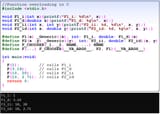Anonymous
8/18/2025, 1:10:33 PM
No.106300522
>>106300549
>>106300652
>>106300659
>>106300689
>>106300747
>>106300794
>>106300811
>>106300917
>>106300922
>>106301239
>>106301298
>>106301353
>>106301936
>>106305043
>>106305060
>>106305175
>>106305287
>>106305614
>>106306687
>>106307011
>>106307589
>>106307782
>>106308435
>>106308918
>>106312466
>>106317729
>>106319461
>>106321367
Function Overloading in C
You don't need more.










